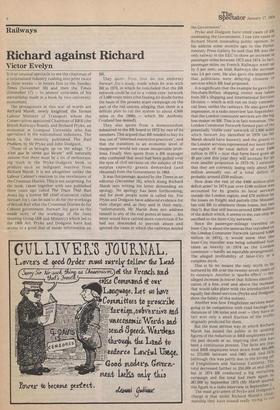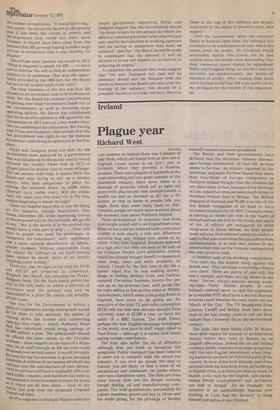Richard against Richard
Victor Evelyn
It is an unusual spectacle to see the chairman of a nationalised industry rushing into print twice in three weeks — in letters first to the Sunday Times (November 30) and then the Times (December 17) — to answer criticisms of his stewardship made in a book by two university economists.
The protagonists in this war of words are Richard Marsh, newly knighted, the former Labour Minister of Transport whom the Conservatives appointed Chairman of BRB (the British Railways Board), and Richard Pryke, an economist at Liverpool University who has specialised in the nationalised industries. The book is the recently published The Rail Problem, by Mr Pryke and John Dodgson.
Those of us brought up on the adage "Cc n'est que la verite qui blesse" will naturally assume that there must be a lot of embarrassing truth in the Pryke-Dodgson book to produce stu..h an indignant reaction from Richard Marsh. It is not altogether unlike the Labour Cabinet's reaction to the revelations of the Crossman Diaries. This is not surprising, for the book, taken together with one published three years ago called The Train That Ran Away (by a former BR chief economist called Stewart Joy), can be said to do for the workings of British Rail what the Crossman Diaries do for Cabinet government. Stewart Joy gave us the inside story of the workings of the Joint Steering Group (BR and Ministry) which led to the 1968 Act. Pryke and Dodgson have had access to a good deal of inside information on BR.
They quote from (but do not endorse) Stewart Joy's study, made when he was with BR in 1970,.in which he concluded that the BR network could be cut to a 'viable core' network of 3,800 route miles (this finding no doubt forms the basis of the present scare campaign on the part of the rail unions, alleging that there is a definite plan to cut the system to about 4,000 miles in the 1980s — which Mr Anthony Crosland has denied).
They also quote from a memorandum submitted to the BR board in 1972 by one of its members. This argued that BR needed to buy its way out of "inherited restrictive practices", and that the transition to an economic level of manpower would not cause insuperable problems. Finally they quote from a BR manager who confessed that wool had been pulled over the eyes of civil servants on the subject of the surplus capacity grants demanded (and obtained) from the Government in 1968.
It was this passage, quoted by the Times in an editorial (December 16), which stung Richard Marsh into writing his letter demanding an apology. No apology has been forthcoming; and for most people none is called for. For Pryke and Dodgson have adduced evidence for their charge; and, as they said in their reply, "unfortunately Mr Marsh does not address himself to any of the real points at issue. . . his letter would have carried more conviction if he had not descended to peevish abuse and ignored the cases in which the railways misled
Spectator
t January 17, 1976 he Government".
Pryke and Dodgson have cited cases of BR misleading the Government. I can cite cases of Richard Marsh misleading public opinion. In his address some months ago to the Parliamentary Press Gallery he said that BR was the only railway in the EEC to show an increase in passenger-miles between 1973 and 1974. In fact, passenger-miles on French Railways went up by 5 per cent; on Irish Railways the increase was 3.8 per cent. He also gave the impression that politicians were delaying closures of services which BR had proposed.
It is significant that the example he gave (the Heysham-Belfast shipping route) was taken from BR's Shipping and International Services Division — which is still run on truly commercial lines, unlike the railways. He also gave the impression, in a radio interview last September, that the London commuter services are the big loss-maker on BR. This is in fact nonsense. The London Commuter Network formed part of the potentially 'viable core' network of 3,800 miles which Stewart Joy identified in 1970 (as Mr Marsh should have known); and the grants to the London services represented not more than one-eighth of the total deficit of over £400 million in 1974 — now that fares have gone up 49 per cent this year they will account for an even smaller proportion in 1975-76; I estimate that they are currently losing only about £40 million annually out of a total deficit of probably around £550 million.
How does the rest of the £400 million-pluS deficit arise? In 1974 just over £100 million was accounted for by grants to local services outside the London region; and £70 million by the losses on freight and parcels (the Minister has told BR to eliminate these losses, but can they?). But that still leaves around £200 million of the deficit which, it seems to me, can only be ascribed to the Inter-City network.
Since the passenger-mileage travelled on Inter-City is about the same as that travelled on the London Commuter Network (around 8,000 million in 1974), it would seem that the Inter-City traveller was being subsidised four times as heavily in 1974 as the London commuter — hardly an equitable arrangement. The alleged profitability of Inter-City is a complete myth. This is by no means the only myth to be nurtured by BR over the twenty-seven years of its existence. Another is 'sparks effect' — the alleged increase in travel that follows electrification of a line, over and above the increase that would take place with the introduction of equally fast diesel services (Pryke and Dodgson shOw the falsity of this notion). Another was how Freightliner services were going to be competitive with road haulage fbr distances of 100 miles and over — they have I.T1 fact won only a small fraction of the traffic originally predicted for them. But the most serious way in which Richard Marsh has misled the public is by quoting figures of the reduction in BRB employees over the past decade or so, implying that this has been a continuous process. The facts are that total BRB employees Went down from 464,000 to 273,000 between end-1963 and end-1970 (although this was partly due to the hiving off of Freightliners arid National Carriers). 1,e. total decreased further to 250,000 at end-19!3, but in 1974 BR conducted a big recruiting campaign and the total had risen again to. 267,000 by September 1975 (Mr Marsh quoted this figure in a radio interview in September.),_
The main gravamen of Pryke and Dodgsob charge is that under Richard Marsh's chal the number of employees. "It would be wrong," they argue, "to excuse the Board on the ground that it has been the victim of events and foreseen that could not have been
roreseen. It should have been clear from the
moment that BR gave up hoping to make large savings in manpower that it was heading for disaster."
This echoes what Stewart Joy wrote in 1972: "What is required is simply for BR . . to have and to exercise the will to find an independent solution to its problems. That was the opportunity provided by the 1968 Act, but the Board has not so far availed itself of the offer."
The clear intention of the Act was that BR Should cut its investment coat to fit its financial cloth. But the Board has instead concentrated on getting ever larger investment funds out of the Government, as well as incurring huge operating deficits. Mr Marsh has complained that the level of investment in BR agreed by the Government in 1972 was cut a few weeks later. One can understand his annoyance. But having read Pryke and Dodgson I feel certain that the last government was right to cut the planned investment—and wrong to approve it in the first Place, Pryke and Dodgson point out that the BR investments were approved by a government that was influenced by the public outcry which followed the Sunday Times leak in 1972 of alleged plans for drastic cuts in route mileage. The rail unions—with help, it seems, from the Board—are now trying to stir up a similar °uterY, with their allegations of plans for cutting the network down to 4,000 miles
(Stewart Joy's 'viable core'). Will the public react the same way this time? Or is the new realism beginning to break through?
There are hopeful signs. that it may be doing so. For instance, George Hutchinson (the Times, December 20), while expressing horror at the proposed cuts in the network, did go on to Say: "But if the attack is to be averted the Unions have a,.vital part to play . : . They will have to accept the need for economies in manpower, for redundancy, early retirement and a more rational distribution of labour, smaller numbers. Without cooperation from the unions the railways as we have known them cannot be saved, short of an utterly Crippling public subsidy." There are, alas, no signs so far that the NUR ,...and ASLEF are prepared to cooperate. weighell, like Marsh, has attacked the Prykebodgson book, Yet the book surely points the way to the only basis on which a network of anywhere near the present size can be Maintained at a price the nation can sensibly afford to pay. °Ile way for the Government to induce a pirit of cooPeration among railwaymen would 7 for them to take seriously the option of r c)„sing down the system and converting Hays into roads — which Professor Peter has calculated would bring savings of 00 million a year. The railwaymen should _ue offered the same option as the Chrysler workers — state support on the basis of a 30 per ,_cerit cut in staff (though on BR the cuts could 1....DesPread over several years). It would certainly Lue crazY for the Government to go on pumping ruundreds of millions of our money into both the _ailways and the manufacture of cars. Investr"lent in railways will have a negligible effect on road traffic volumes, and therefore has little to ecommend it in environmental terms (it is not oas if trains are all that silent — look at the -,,uterY last year Over the proposed Channel onnel rajl link). As if in response to Richard Marsh's plea for
clearer government objectives, Pryke and Dodgson suggest that the Government should "lay down targets for the amount by which the deficit at constant prices has to be reduced each year, and for the reduction in working expenses and the saving in manpower that must be achieved", and that "the Beard should be made to understand that the amount it will be allowed to invest will depend on its success in achieving its targets."
To underline the position they even suggest that "the new Transport Act that will be necessary should arm the Minister with the power to dissolve the Board and take over the running of the railways; this should be a powerful incentive towards solvency because those at the top of the railways are largely motivated by the desire to preserve their own empire."
Until the Government takes the situation firmly in hand -on these lines, the railways will continute to be a bottomless pit into which the nation pours its money. Mr Crosland would presumably favour this course, for he had written about the middle class demanding that their commuter travel should be subsidised. Pryke and Dodgson bring out the fact that rail travellers are predominantly the better-off members of society. After reading their book one is inclined to feel that BR is an outfit run by the profligate for the benefit of thp importunate.



























 Previous page
Previous page